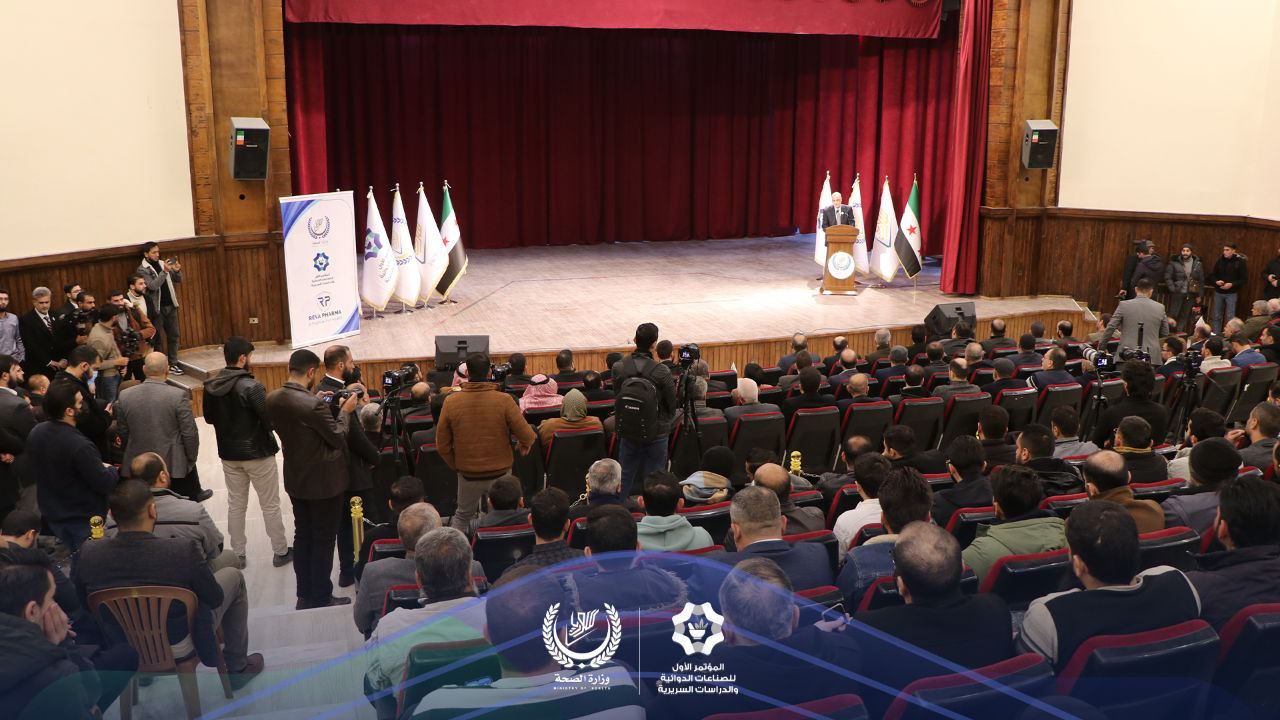
The Syrian Salvation Government (SSG) Ministry of Health launched the First Conference on Pharmaceutical Industries and Clinical Studies today at the Culture and Knowledge House in Idlib. The event was held under the slogan “The Pharmaceutical Industry from Crises to Building”, and aims to strengthen the pharmaceutical sector in northwestern Syria while facilitating collaboration among researchers, manufacturers, and healthcare providers.
The three-day symposium, which began today and will continue until Thursday, serves as a scientific and cultural platform for discussing the latest advancements in pharmaceutical production, clinical research, and regulatory practices. Attendees can explore exhibitions of medical devices, books, and even a simulation room designed to demonstrate pharmaceutical production processes. A Cultural Medical Salon will host discussions on pressing health issues, including a seminar on the risks and misuse of antibiotics.
Engineer Muhammad Al-Bashir, Prime Minister of the SSG, emphasized the importance of pharmaceutical innovation in achieving health security for the region.
“Securing medicine, improving their clinical quality and pharmaceutical industries, and delivering them to those in need is our duty,” Al-Bashir said during the opening session. He expressed hope that the conference would “lay the foundations for advancing the health sector and achieving (medical) drug security.”
Dr. Mazen Dukhan, the SSG’s Minister of Health, highlighted the conference’s role in fostering scientific research and supporting local pharmaceutical industries. “The pharmaceutical industry is not just an economic sector but a fundamental pillar of national health security,” he said. Dr. Dukhan stressed the ministry’s commitment to creating a regulatory environment that promotes innovation while ensuring quality and safety.
The conference comes at a critical time for Idlib, where residents face challenges accessing affordable and effective medication. Local production currently meets only 30% of the region’s needs, with the remainder imported under stringent quality control measures. Recent initiatives have focused on phasing out ineffective foreign medicines and promoting local manufacturing to improve drug safety and availability.
Ibrahim Al-Hassani, Director of Pharmaceutical Quality and Safety Control, underscored efforts to regulate pricing and monitor the quality of medicines in local pharmacies. “All medicines currently in pharmacies are safe, high-quality, and effective,” he said, adding that the adoption of Good Manufacturing Practices (GMP) rules has been instrumental in maintaining these standards.
The conference has attracted over 28 speakers, including academics and pharmaceutical experts from the United States, Europe, Egypt, and Syria’s liberated areas. Topics range from pediatric and neurological treatments to innovations in drug manufacturing. Pharmaceutical companies, both local and Turkish, are showcasing their products and exploring potential partnerships.
The event also seeks to enhance public trust in local pharmaceuticals and position the region as a potential exporter of high-quality medicines. “This conference is an opportunity to demonstrate the progress of our pharmaceutical industry and its potential to contribute to regional and global markets,” said Dr. Dukhan.
Street interviews in Idlib revealed a mix of optimism and ongoing concerns among residents about the availability and affordability of medicines. Many locals expressed frustration with high prices and reliance on alternative medications when prescriptions are unavailable.
“The medicines are available, but they are expensive,” one resident shared. Another emphasized the importance of ensuring that alternatives meet the same quality as original prescriptions. Dr. Al-Hassani acknowledged these challenges, reiterating the ministry’s commitment to expanding local production and ensuring pricing fairness.
The First Conference on Pharmaceutical Industries and Clinical Studies runs until Nov. 28. It aims to set the stage for a more resilient and innovative pharmaceutical sector in northwestern Syria. For residents and healthcare professionals, the event represents a critical step toward addressing longstanding challenges in healthcare access and quality. The SSG has extended an open invitation to the public, urging attendance to learn more about the region’s advances and to participate in the dialogue on shaping its future.








